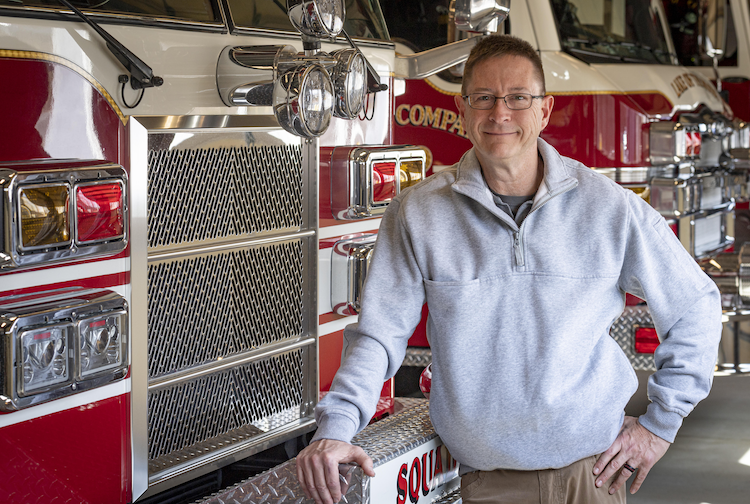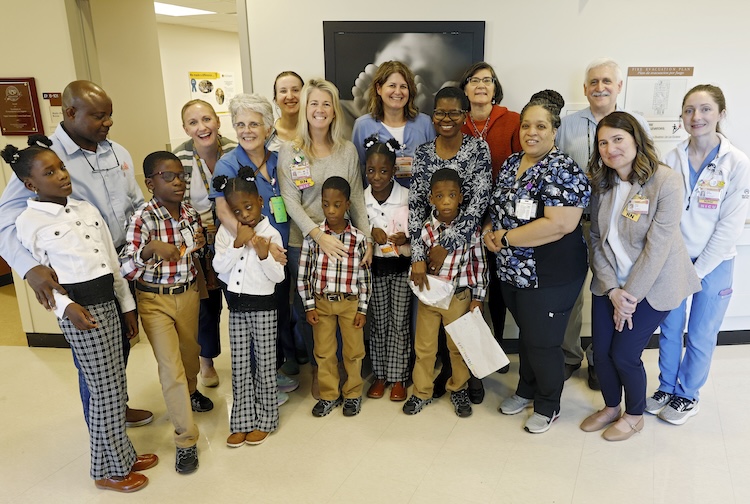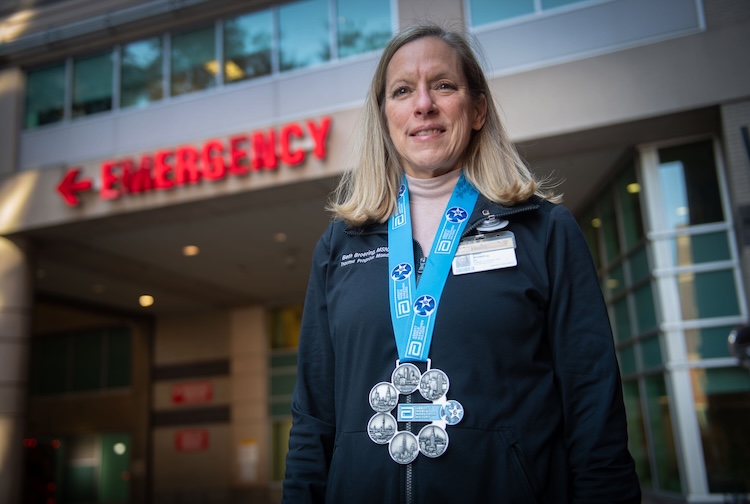VCU Health CMH nurse donates kidney in 'paired exchange'
She donates to a stranger; stranger's sibling donates to nurse's sister
December 13, 2021
Approximately 100,000 people are currently waiting for a kidney transplant in the United States. The average wait time is about five years, and 22 people die each day waiting for a transplant.
In July 2021, surgical nurse Carol Chapman, R.N., donated a kidney to a stranger so her sister could receive another kidney from a paired donation. Here is Carol's story.
Living donation on her mind a long time
At VCU Health Community Memorial Hospital, South Hill resident Carol K. Chapman educates patients on what to expect before and after surgery. A nurse for 24 years, Carol is a caring and giving person who always thought it would be neat to give someone the gift of life through kidney donation.
"I attended conferences about transplants and heard people tell remarkable stories of how it changed their lives," Carol explained.
Carol's sister, Evon Walker, was diagnosed with a kidney disorder six years ago. She did not yet need dialysis, but she was headed in that direction. Carol knew that her sister would do better if she received a kidney from a living donor. Living donation has a number of advantages, such as getting a patient transplanted faster. The kidney from a living donor is often healthier and lasts longer than a kidney from a deceased donor.
As a surgery nurse, Carol knew what surgical patients go through. So when she made her offer to donate a kidney, she understood what she was in for. Before donating, though, she had to undergo several tests to even qualify for being a donor and undergo surgery. She had tissue typing to check her compatibility with the organ recipient. Doctors then had to make sure she was healthy enough to donate. One cannot donate a kidney if they have uncontrolled blood pressure issues, diabetes or active cancer. Among other tests, Carol underwent a colon cancer screening, a well-woman exam and a mammogram.
Paired organ exchanges happening more often
Because their blood types didn't match, Carol and her sister were part of a paired exchange, colloquially known as "swaps". Within a 250-mile radius, VCU Health's Hume-Lee Transplant Center found another sibling pair in which a woman donated a kidney to Evon and Carol's kidney went to the woman's brother. All four surgeries were performed on the same day.
In 2018 and 2019, the Hume-Lee Transplant Center has performed 2-4 paired exchanges. In 2020, they completed eight.
"At Hume-Lee, we are steadfastly committed to living kidney donation and living donor kidney transplants. It symbolizes our mission to provide state-of-the-art, excellent and compassionate care to both living donors and recipients." said Dr. Dhiren Kumar, transplant nephrologist and living donor kidney transplant medical director at VCU Health Hume-Lee Transplant Center.
"Paired exchanges are an innovative way to fight the national organ shortage. We are excited to offer more and more paired exchanges to patients who will benefit."
Donors aren't responsible for costs
The transplant recipient's insurance covers the donor's tissue typing, surgery and recovery. Carol's insurance company covered the cost of her imaging. VCU Health gives employees 240 hours of paid leave for donating an organ. And in the very rare chance Carol ever needs a kidney, she will go to the top of the transplant waiting list.
Carol's surgery and recovery
Carol's robotic-assisted surgery took about four hours and was performed by Dr. Amit Sharma, M.D.
"My experience at VCU Medical Center was amazing," Carol said. "The coordinator was very knowledgeable and helped me through every step of the way. The room was top-of-the-line, like a hotel room with a giant sitting room. I was treated like royalty. I had a personal chef who delivered my meals on a white linen cart with fresh flowers."
Living donors can be discharged after just two days. Full recovery may take a few weeks. Two weeks after her surgery, she felt well enough to fly to Mississippi for vacation.
Future is bright
For Evon, the road to recovery is already bright.
"I feel so blessed that I am able to have a better quality of life with my new kidney," Evon said. "I have so much more energy."
Four months later, the sibling pairs finally got to meet each other. Carol was excited to meet the man who now has her kidney.
"To be able to help someone like this, it's the best feeling in the world," she said.
Hughton Maye, of Chesterfield, received Carol's kidney. His sister, Sophia Maye-Smith, donated a kidney to Evon. Hughton had been on dialysis for two years. He is a chaplain and completed his internship at VCU Health.
"I am grateful," Hughton said with a smile. "I was expecting to be on dialysis for several more years, so God had his hand in this."
Sophia said, "You don't think it's a big deal until you get to surgery day. The care team was so patient with me. I never felt like I was just another patient. They were kind, warm and sincere."
The meeting was emotional. Tears of appreciation were shed. Laughter and camaraderie filled the room. As they shared their experiences, they realized the struggles they encountered and the impact they had on each other, and it was amazing. The siblings exchanged contact information so they can stay in touch with their new friends.
Learn more.
Anyone interested in joining VCU Health's living kidney donor list can find more information at https://www.vcuhealth.org/hume-lee-transplant-center/living-donation/living-kidney-donation/.




